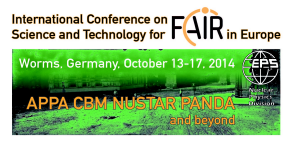Sprecher
Jerzy Pietraszko
(GSI)
Beschreibung
The HADES spectrometer [1] designed to measure e+e- pairs (dielectrons) in the SIS∕BEVALAC energy regime is currently being operated at GSI Darmstadt and is foreseen as one of the first experiments at the future FAIR facility. One of the main objectives of the experimental approach is to systematically explore electromagnetic emissivity of compressed baryonic matter formed in the course of heavy ion collisions and to ultimately assess in-medium hadron properties. For this purpose a dedicated programme focusing on systematic investigation of dielectron production in nucleon-nucleon, proton-nucleus and heavy ion reactions has been conducted. A comparison of the nucleon-nucleon data to the one obtained in more complex systems allows for the isolation of in-medium effects [2][3]. Furthermore, as the spectrometer features excellent particle identification capabilities, the investigations have been extended to strangeness production, which in this energy regime is confined to the high density zone of the collision. In particular, appealing new results on hadrons containing two strange quarks (\phi, \varXi(1321)) [4][5] have been obtained.
In this contribution, an overview of recent results as well as of future perspectives, in particular with the focus on the HADES at FAIR project, will be given.
[1] G. Agakishiev et al. Eur.Phys.J.A41:243-277,2009.
[2] G. Agakishiev et al. Phys.Rev. C84 (2011) 014902
[3] G. Agakishiev et al. Phys.Lett.B690:118-122,2010
[4] G. Agakishiev et al. Phys.Rev.C80:025209,2009.
[5] G. Agakishiev et al. Phys.Rev.Lett.103:132301,2009.
Autor
Jerzy Pietraszko
(GSI)

